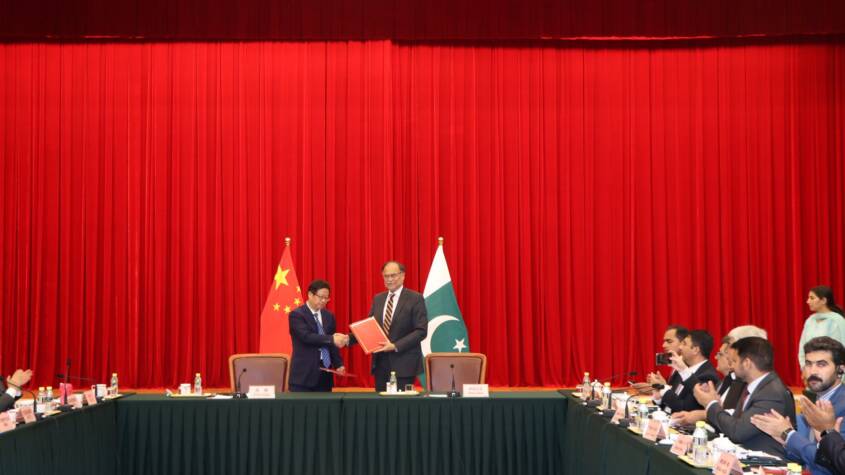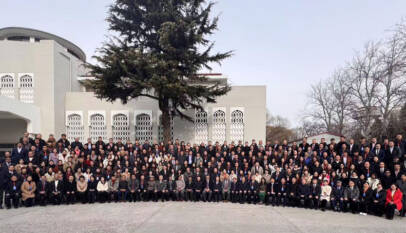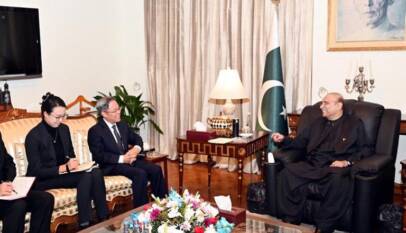JCC to review progress on Gwadar port development and upcoming infrastructure projects
The Joint Cooperation Committee (JCC) under the China-Pakistan Economic Corridor (CPEC) is set to discuss Pakistan’s request for finalizing the financing agreement for the Mainline (ML-1) construction, amounting to $6.7 billion, amid concerns regarding the increasing circular debt of Chinese Independent Power Producers (IPPs) and security issues. The revised scope of ML-1, approved by the Central Development Working Party (CDWP), involves reducing train speeds, modifying features to cut costs, and incorporating dual rail tracks. Additionally, three new areas of cooperation, including science and technology, agriculture, and information technology, are likely to be discussed, highlighting the growth in bilateral cooperation in these fields. The CPEC’s strategic significance for Pakistan’s sustainable development is emphasized, with achievements noted in energy, transport infrastructure, industrial cooperation, and socioeconomic development. The progress in various sectors, such as energy projects, motorways/highways, industrial zones, Gwadar Port development, and socioeconomic projects, reflects the multifaceted nature of CPEC’s impact on Pakistan’s economy and development.
ISLAMABAD: Amid increasing concerns about the escalating circular debt of Chinese IPPs and the security of their personnel, the Joint Cooperation Committee (JCC) under CPEC is all set to consider Pakistan’s request for finalising financing agreement for Mainline (ML-1) construction at cost of $6.7 billion.
The revised PC-1 approved by the Central Development Working Party (CDWP) recommended the ECNEC for approving the first phase of ML-1 at the cost of $3.3 billion. The scope of ML-1 was revised after which the speed of trains would be reduced from 160-180-km to 120-kilometres. There will be dual rail tracks, but different bridges and other features have been modified to reduce its cost.
There will be three new areas which might come under discussion in JCC, being held on Friday (today). In Science and Technology, Science, technology, and innovation cooperation has reached new height. Projects, such as the Talented Young Scientist Programme (TYSP), China-Pakistan Joint Research Centre on Earth Sciences (CPJRC), and China-Pakistan STEM Education Hundred Schools Alliance Project have achieved significant progress. Joint research, personnel exchange, technology transfer, and cooperation in other areas have flourished. Both sides will work together to tap into the cooperation needs, develop higher-quality cooperation projects, and give better role to science, technology, and innovation in bolstering high-quality CPEC and China-Pakistan cooperative relations.
On agriculture, CPEC has increased the potential of agricultural cooperation between China and Pakistan. The bilateral agricultural trade grew from US$590 million to US$1.32 billion from 2013 to 2022, a 124 per cent increase. The cooperation has expanded from trade to investment and services. The cooperation on crop production, seed development, water management, agro-product processing, agricultural machinery, and information application has also flourished. Investments by Chinese companies in buffalo breeding and dairy processing, chili contract farming and processing and donkey slaughterhouse and product processing have successfully been initiated. Both sides will work together to launch more public and private sector initiatives to bolster industries, benefit peoples for win-win cooperation in agriculture.
On information technology, efforts are underway to strengthening cooperation in ICT Infrastructure Development, ICT Application Innovation, Cybersecurity, Policy and Regulation, Radio Spectrum Regulation and Human Resource Development and encourage enterprises from both sides to expand cooperation in this sector.
As the flagship project of Belt and Road Initiative, CPEC is of strategic significance for Pakistan and its sustainable growth and development. Phase-I of CPEC has transformed Pakistan’s economic landscape laying a solid foundation for cooperation in industrialisation, agriculture, science and technology and socioeconomic development and has directly created 236,000 jobs, provided employment to more than 155,000 Pakistanis.
In the 2nd phase, Chinese companies are expected to invest in the industrial sector. There are a number of opportunities for Chinese investors to make profitable investments in variety of sectors of Pakistan.
Energy: The CPEC energy projects have stimulated the vitality in Pakistan’s economic development. Up to now, 19 energy projects with a total installed capacity of 13,010-MW have been commissioned. Among them, 14 projects have been put into commercial operation, with a total installed capacity of 8,020-MW, accounting for 19.4pc of Pakistani total installed capacity, and achieving a 4000-MW of transmission capacity.
Electricity Generation Capacity added: 8,020-MW (plus development of Thar coalmines 15 MTPA)
Transmission Lines completed: 880-km
1 Project (Suki Kinari HPP) currently under implementation: 884-MW
Projects at planning stage including Kohal HPP, Azad Pattan HPP, Gwadar Coal Power Plant: 4,144-MW
Transport Infrastructure: Transport Infrastructure sector under CPEC has also made significant accomplishments. Signature projects, including KKH-II (Havelian-Thakot) project, Peshawar to Karachi Highway (Sukkur-Multan) and Lahore Orange Line, have been operating smoothly. The comprehensive and multi-dimensional CPEC infrastructure network, led by Gwadar Port, mainlining of KKH project, and improvement in air transportation contributed towards developing Pakistan into a regional connectivity hub and in modernization of Pakistan’s economy.
809-km of new Motorways/Highways (3 projects – including one through PSDP) completed
Orange Line Metro Train Project completed
820-km Optic Fibre laid
Infrastructure projects under construction: 5 road projects (676-km – 4 PSDP)
International airport at Gwadar (under construction through Chinese grant from CIDCA)
Major infrastructure projects in pipeline: Railways – Main Line-1 (ML-1): 1733-km. Chinese side is being urged to expedite the approval of financing for development of Phase-1 of the project and revised PC-1 submitted to Planning Commission for consideration and Karachi Circular Railway (planned to be executed in G2G mode), revised feasibility study submitted to Chinese side.
Industrial cooperation: Industrial cooperation under CPEC is pivotal for the second phase of CPEC’s high quality development. CPEC Framework Agreement on Industrial Cooperation has been signed. The construction of the Rashakai Special Economic Zone, Phase-I has been completed and efforts are being made to populate it with Chinese and other enterprises. Both sides agreed to implement the Framework Agreement on industrial cooperation for tangible outcomes, and to reached consensus on mining cooperation, B2B collaboration and relocation of Chinese industries in the SEZs as the breakthrough for next phase cooperation. The Chinese enterprises are encouraged to establish B2B linkages with Pakistani companies whereas the Pakistani government continues to improve its business environment and provide utmost facilitation to the Chinese companies, making industrial cooperation more successful.
4 SEZs (Rashakai, Faisalabad, Dhabeji, Bostan) out of total nine agreed SEZs and Gwadar Free Zone being developed on priority.
Gwadar: Gwadar Port, as the leading CPEC project, can now successfully operate at full capacity. The Gwadar Free Zone phase-1 (60 acres) has been successfully completed and supporting facilities have been improved and much larger phase-II (2,221 acres) being developed; Eastbay Expressway (19-km); Faquer School, Pak-China Technical & Vocational Institute, Pak-China Friendship Hospital Gwadar; 1.2 MGD Seawater Desalination Plant and Fraternity Emergency Care Centre have been completed and transferred to Pakistani authorities. New Gwadar International Airport is near completion, and the dredging project is under implementation. Efforts are underway to enrich the business scope of Gwadar Port and Free Zone, and facilitate in the improvement of transport, healthcare, water and power supply, and education for the port city.
Projects completed: Seven projects (Eastbay Expressway, Gwadar Port & Free Zone (Phase-I), Smart Port City Master Plan, Vocational Institute and Water Supply, Gwadar Hospital & 1.2 MGD Desalination Plant).
Projects under implementation: Two projects (NGIA and 300MW Coal Power Plant)
Projects in pipeline: Five projects (Construction of Breakwater, Dredging of Berthing Areas and Channels, Gwadar Smart Environmental & Sanitation System and landfill, Gwadar Fish Harbour and 2 MGD Desalination Plant (PSDP). Socioeconomic development: Socioeconomic Development Cooperation under CPEC has achieved effective and practical fruits. Total 27 projects have been conceived in two batches (1st Batch 17 projects & 2nd batch 10 Projects), so far, in 6 areas (agriculture, education, healthcare, poverty alleviation, power supply, vocational training) have been successfully implemented, improving local healthcare and education conditions.
Projects completed: 11
Projects under Implementation: 10
Projects in pipeline: 6
List of 3rd batch 57 projects shared with Chinese side for consideration during the 3rd JWG meeting on Socioeconomic Development.
Pakistan’s capital market delegation visits China, signs MoUs
Karachi – A high-level delegation from Pakistan’s capital market, led by Mr Akif S…












